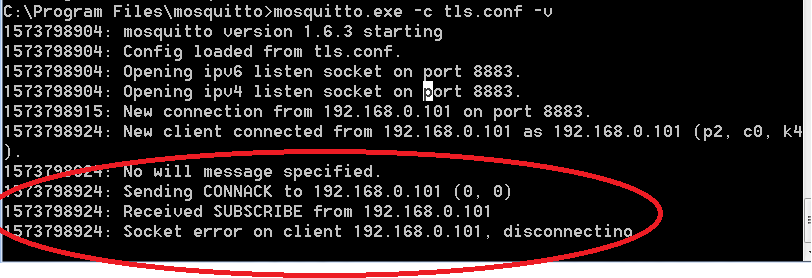MQTT-C is an MQTT v3.1.1 client written in C. MQTT is a lightweight publisher-subscriber-based messaging protocol that is commonly used in IoT and networking applications where high-latency and low data-rate links are expected. The purpose of MQTT-C is to provide a portable MQTT client, written in C, for embedded systems and PC's alike. MQTT-C does this by providing a transparent Platform Abstraction Layer (PAL) which makes porting to new platforms easy. MQTT-C is completely thread-safe but can also run perfectly fine on single-threaded systems making MQTT-C well-suited for embedded systems and microcontrollers. Finally, MQTT-C is small; there are only two source files totalling less than 2000 lines.
It's been great to hear about all the places MQTT-C is being used! Please don't hesitate to get in touch with me or submit issues on GitHub!
To use MQTT-C you first instantiate a struct mqtt_client and initialize it by calling
@ref mqtt_init.
struct mqtt_client client; /* instantiate the client */
mqtt_init(&client, ...); /* initialize the client */Once your client is initialized you need to connect to an MQTT broker.
mqtt_connect(&client, ...); /* send a connection request to the broker. */At this point the client is ready to use! For example, we can subscribe to a topic like so:
/* subscribe to "toaster/temperature" with a max QoS level of 0 */
mqtt_subscribe(&client, "toaster/temperature", 0);And we can publish to a topic like so:
/* publish coffee temperature with a QoS level of 1 */
int temperature = 67;
mqtt_publish(&client, "coffee/temperature", &temperature, sizeof(int), MQTT_PUBLISH_QOS_1);Those are the basics! From here the examples and API documentation are good places to get started.
There are only two source files that need to be built, mqtt.c and mqtt_pal.c.
These files are ANSI C (C89) compatible, and should compile with any C compiler.
Then, simply #include <mqtt.h>.
Alternatively, you can build MQTT-C with CMake or the provided Makefile. These are provided for convenience.
Pre-built documentation can be found here: https://liambindle.ca/MQTT-C. Be sure to check out the examples too.
The @ref api documentation contains all the documentation application programmers should need. The @ref pal documentation contains everything you should need to port MQTT-C to a new platform, and the other modules contain documentation for MQTT-C developers.
The MQTT-C unit tests use the cmocka unit testing framework.
Therefore, cmocka must be installed on your machine to build and run
the unit tests. For convenience, a simple "makefile" is included to build the unit tests and
examples on UNIX-like machines. The unit tests and examples can be built as follows:
$ make allThe unit tests and examples will be built in the "bin/" directory. The unit tests can be run
like so:
$ ./bin/tests [address [port]]Note that the \c address and \c port arguments are both optional to specify the location of the MQTT broker that is to be used for the tests. If no \c address is given then the Mosquitto MQTT Test Server will be used. If no \c port is given, port 1883 will be used.
MQTT-C provides a transparent platform abstraction layer (PAL) in mqtt_pal.h and mqtt_pal.c.
These files declare and implement the types and calls that MQTT-C requires. Refer to
@ref pal for the complete documentation of the PAL.
Please feel free to submit issues and pull-requests here. When submitting a pull-request please ensure you have fully documented your changes and added the appropriate unit tests.
This project is licensed under the MIT License. See the
"LICENSE" file for more details.
MQTT-C was initially developed as a CMPT 434 (Winter Term, 2018) final project at the University of Saskatchewan by:
- Liam Bindle
- Demilade Adeoye













